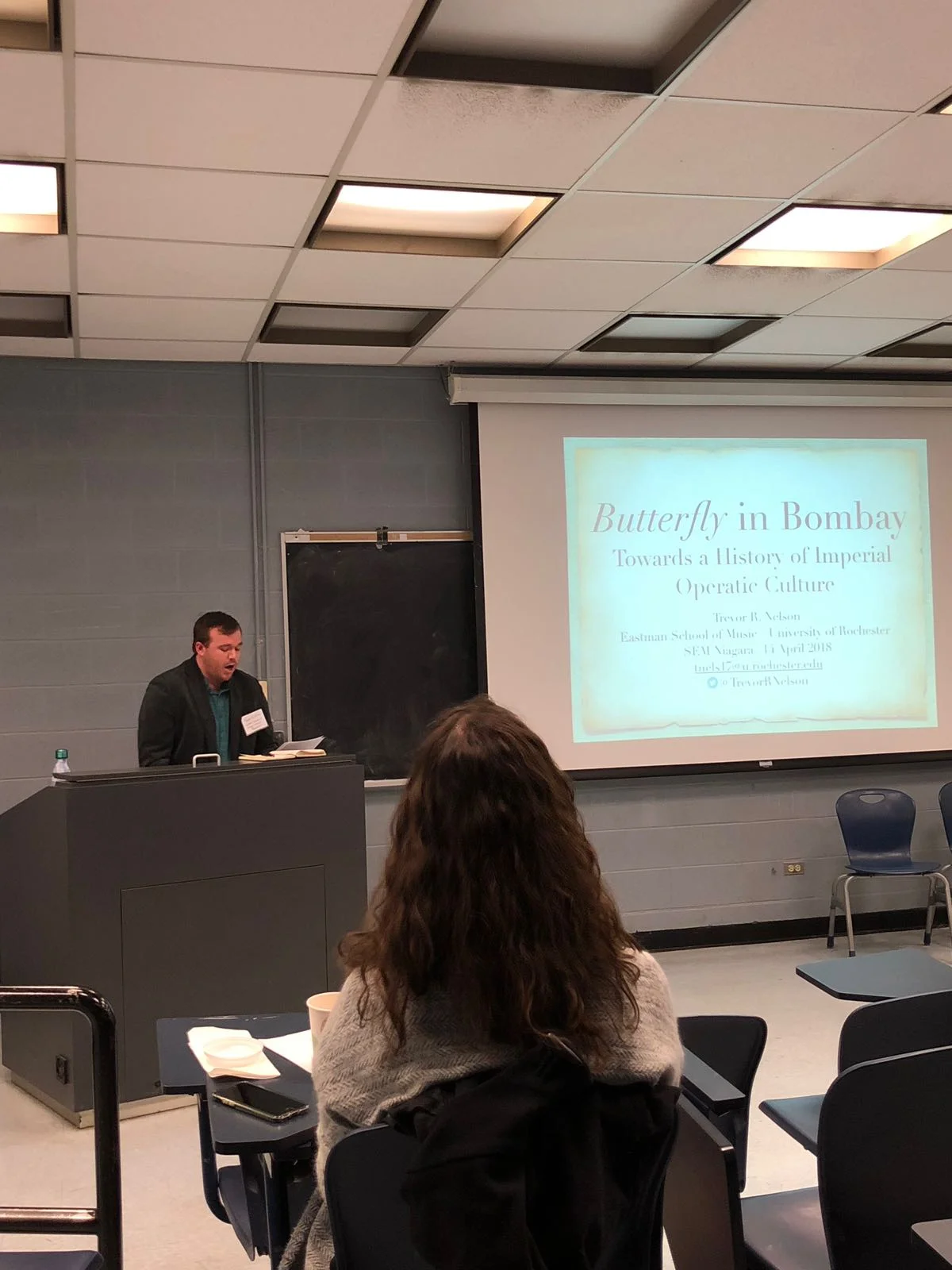Select Conference Presentations
Divorced, Beheaded, Died, Survived: Listening to Race-Neutral Casting in Six
This presentation at the 2022 AMS National Conference explores issues of race and genre in the hit 2017 musical Six. In the paper, I examine how the show’s creators used sonic Whiteness and Blackness in influencing the audience’s understanding of various characters, notably Anna of Cleaves and Catherine Howard. I focus on what happens when race-neutral casting conflicts with attempts to ignore race in popular music styles. By relying on racialized musical idioms to stand in for characterization, the creators’ boost stereotypes like the White ingénue and the sassy Black woman while simultaneously reinforcing history’s tendency to reduce women to single characteristics. This troubling use of character-specific racial soundscapes undermines Six’s progressive agenda and is symptomatic of an inconsistency toward racial justice among many in Britain.
Sing a Song of Commonwealth: BBC School Music Broadcasts and the Formation of Post-Imperial Children
This presentation at the 2021 Society for the History of Children and Youth Virtual Conference considers how radio broadcasting—particularly programming intended for British primary schools—reformed the geopolitical mindset of young Britons. I use Empire Day programming as a case study, tracking how broadcasts adapted to the realities of imperial decline brought about by World War II and nationalist movements around the Empire. I use records from the BBC WAC to demonstrate how educators and programmers shifted musical content from songs promoting a jingoistic Britain to recordings of musical styles from around the globe, all meant to develop youth support for the emerging Commonwealth. Yet by the time the Macmillan government renamed the holiday in 1958 to Commonwealth Day, the BBC had abandoned the holiday, finding the venture outdated. I argue that the BBC and British educators remained a step ahead of the UK government in their understanding of children’s media and their importance in shaping globally minded British youth.
Communicating Commonwealth: Reframing Imperial Identity Through the BBC’s Commonwealth of Song
This presentation, programmed at the 2020 American Musicological Society Virtual Conference, explores the UK’s Commonwealth Projection Policy and one musical example of it, the BBC radio series Commonwealth of Song (1953-1961). As I demonstrate, there were many debates concerning the representation of race, class, and Americanization in during the nine-year run of the program, and these mirrored broader disagreements about the Commonwealth as a geopolitical organization. Even as the BBC and the national government wanted to project the Commonwealth as a community of equal nations, programming on Commonwealth of Song reinforced the idea of a Britain and British Culture first organization.
“What D’You Mean Saint George Was A Turk?”: Britishness, brexit, Englistan
This was part of the Spring 2020 Music Scholarship at a Distance Colloquium. The paper considers musical responses to the UK’s 2016 European Union Referendum (more commonly known as Brexit). In this paper, I considered the political work of Riz Ahmed’s album Englistan, which was released in the run up to the Brexit vote. I analyzed the use of audio-visual parody and revisionist history as political tools in the music video for “I Ain’t Being Racist But…,” which features Ahmed taking on the identity of a British white nationalist, spouting vitriol about problems caused by migrants, while concurrently employing the visual imagery of Islamic jihadists. Drawing on the work of Homi Bhabha, I argue that, in effect, Ahmed is performing an act of parodic, reverse mimicry, while also using historical writing as an emancipatory device for the oppressed. In doing so, Ahmed stages a musical event where the colonizer sees the errors in his assumptions about race and Britishness through encountering an inclusive history of people of color in Britain.
Girls Just Want to Have Fun: Girlhood and Its Ideological Use in Alan Bush’s The Spell Unbound
This presentation at was part of the Cold War Study Group panel at the 2019 American Musicological Society Meeting. I demonstrated how British composer Alan Bush the concept of girlhood to promote the acceptance of post-imperial migrant communities in his operetta for girls, The Spell Unbound (1953). In the work, Bush presents limitations on girls out outdated, while showing girls welcoming new members into their circles of friends, even as adults show fear. I argued that the operetta modeled new archetypes of appropriate behavior in the wake of imperial decline. The presentation featured a performance of the work’s Act I finale, which had not been performed since the 1950s.
The Imperial Echo Chamber: Ethel Smyth and the Sonic Experience of Empire
This presentation at the Mid-Atlantic Conference on British Studies considered what the British Empire sounded like to composer Ethel Smyth. I took her 1935 memoir Beecham and Pharaoh as my starting point, closely reading this text for sonic memory of her 1913-14 Winter holiday to Egypt. In her writing, Smyth continually relates all foreign sounds with those of her home in Surrey, in addition to describing numerous performances of her own compositions by fellow British travelers. I argue that, for Smyth, British-occupied Egypt did not sound all that different from her native England. The British Empire became a kind of echo chamber, where familiar and unfamiliar sounds commingled. This has implications for Smyth historiography, complicating the reasons for her “English turn” in the late 1910s.
“They Must Sing About It Instead”: Audience song and Empire in Britten’s Let’s Make an Opera!
This presentation at the 2018 North American British Music Studies Association conference explored the racial politics of Britten’s pedagogic work Let’s Make an Opera! I demonstrated that by instructing the audience to participate in the problematic racial politics of the work, Britten encouraged the British public to deal with their troublesome imperial past, even as institutions in the United Kingdom advocated for a renewal of native, local culture. This analysis augmented accepted understanding of Britten’s role in constructing national identity and cultural memory.
Butterfly in Bombay: Towards a History of Imperial Operatic Culture
This presentation at the 2018 meeting of SEM-Niagara explored this history of opera in Bombay/Mumbai. Drawing on journalistic discourse published in the Times of India, I analyzed performance trends and the musical value placed on European opera for British colonial elite living in Bombay. I showed that British expatriates in Bombay had a hunger for the art from—a desire eventually leading to the construction of Bombay’s Royal Opera House. I argued that opera served as a potent symbol of Western modernity for Britons separated from the metropole.
Winner of the T. Temple Tuttle Student Paper Prize
Smyth in Context: Feminism, Morality, and The Wreckers
This presentation at the 2016 meeting of AMS-Midwest took Ethel Smyth’s 1906 grand opera The Wreckers as a case study to explore the legacy of Victorian femininity in music. The work uses a number of common operatic tropes (the fallen woman, live burial, cleansing rituals, etc.), all while using these narrative devices in subversive ways. My analysis drew on interdisciplinary methods, calling on theories from literature, anthropology, political science, and sociology to support my argument: by employing these standard images, Smyth fashioned an opera that would be palatable to Victorian consumers, but also inspiring the audience to sympathize with “Others,” who became victims of one community’s unethical traditions. This leaves the spectators questioning a number of important beliefs, such as the dominance of religion and the importance of unified, communal thought.
Public Presentations
“Shall Life Renew These Bodies”: Recent Trends in Britten Studies
This presentation was part of a panel organized by the University of Rochester Humanities Center to coincide with the Eastman Chorale’s performance of Benjamin Britten’s War Requiem in March 2020. In this talk, I provided a view from above, explaining trends in musicological studies of Benjamin Britten and his music. I also acted as a respondent to the panel as a whole. Other speakers included William Weinert (Conductor, Eastman Chorale), Stewart Weaver (History, UR), Bette London (English, UR), Matthew BaileyShea (Music Theory, UR), and Honey Meconi (Musicology, UR & ESM).










